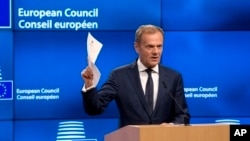The European Union softened its public stance on Britain’s exit from the bloc Friday, with Council President Donald Tusk signaling some flexibility on allowing talks on a new relationship before the divorce proceedings are complete.
Draft guidelines obtained by the Associated Press say that the EU and Britain must first “settle the disentanglement” of Britain from the bloc but added that “an overall understanding on the framework for the future relationship could be identified during the second phase of the negotiations under Article 50.”
The guidelines also say it is a priority to settle questions about British and other European citizens living in each other’s countries, and call for “flexible and imaginative solutions” for the issue of the U.K.’s land border with Ireland.
Talks will be difficult
EU leaders warned after a meeting Friday that the two years of talks triggered this week to negotiate Britain’s exit will be difficult, but insisted they don’t want all-out economic or diplomatic conflict. Tusk is presenting the EU’s draft negotiating guidelines to leaders of the remaining 27 member states Friday.
Tusk said the EU will not punish Britain in the talks, saying that Brexit itself is “punitive enough.” The head of the rotating EU presidency, Maltese Prime Minister Joseph Muscat, insisted the negotiations “will not be a war.”
Tusk said there would not be parallel discussions about Britain’s exit and its future relationship with the EU, but said that the negotiations could move onto a second phase if there is “sufficient progress” in the exit talks.
He didn’t define what kind of progress that would have to be, but said that the 27 remaining EU members would have to agree before moving on.
Threat ruled out
Tusk ruled out the suggestion that there was an inherent threat in British Prime Minister Theresa May’s departure letter Wednesday, which some felt hinted that Britain was threatening to end security cooperation with continental Europe unless it gets a good Brexit deal.
British Foreign Minister Boris Johnson also insisted Friday that Britain’s commitment to European defense and security is “unconditional” and “not some bargaining chip in any negotiations’’ over Brexit.
Johnson, speaking in Brussels upon arrival for a NATO meeting, said he has had good feedback from partners since Wednesday’s British formal announcement of its departure from the EU, despite worries on both sides of the Channel about Brexit.




